Vol. 11 Nº 2 (2022) by Revista Latinoamericana de Opinión Pública (RLOP)
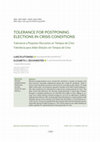
Revista Latinoamericana de Opinión Pública (RLOP), 2022
Election postponements occur around the world for a variety of reasons, but they became especiall... more Election postponements occur around the world for a variety of reasons, but they became especially widespread during the Covid-19 pandemic. Little is known how the public perceives and reacts to such democratic delays. To shed light on this topic, we included a question module in the 2021 AmericasBarometer about tolerance for alterations to democracy during periods of crisis. The data reveal that tolerance for election postponements is quite high. Further, through a wording experiment, we find that the public is more willing to accept such a delay during a health emergency vis-à-vis an alternative condition (widespread violence). We contextualize these findings by comparing them with attitudes about a more extreme anti-democratic disruption: a coup d'etat by security forces. Coups are significantly less popular than election postponements, especially during a health emergency. The results improve our understanding of public appetite for authoritarianism during periods of crisis.
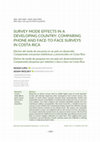
Revista Latinoamericana de Opinión Pública (RLOP), 2022
Responses to phone surveys tend to exhibit higher rates of social desirability bias and extreme r... more Responses to phone surveys tend to exhibit higher rates of social desirability bias and extreme responses when compared to face-to-face surveys. Yet, studies of mode effects typically compare either representative studies that implausibly assume comparability or experimental studies that rely on convenience samples. Our study compares two national probability samples but uses matching to address comparability. We study Costa Rica, a middle-income democracy, to see whether the conventional wisdom drawn from Western Europe and North America extends to the Global South. We analyze two nationally representative surveys, one fielded by phone and one face-to-face, allowing us to compare identically worded items we placed on both surveys. We find that phone respondents exhibited more socially desirable responding and were more likely to choose negative endpoints on scalar items. This suggests that survey researchers and practitioners should carefully assess the tradeoffs in shifting modes or employing mixed modes.
Revista Latinoamericana de Opinión Pública (RLOP), 2022
The manuscript highlights the major role that partisanship plays in moderating voters’ interpreta... more The manuscript highlights the major role that partisanship plays in moderating voters’ interpretation of polling information and incentives to behave strategically. While prior studies highlight that partisans are less likely to vote strategically as the expressive costs of defection increase, this study sheds light on the conditions in which voters—even partisans—behave strategically and which contribute to an increase in the proportion of voters who change their vote intention during campaigns. Only partisans informed about polls are able to overcome their partisan bias and engage in strategic voting. By taking strategic voting into account in the study of campaigns, the present work builds a bridge between the campaigns effects literature and studies on strategic voting.
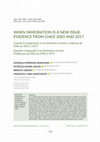
Revista Latinoamericana de Opinión Pública (RLOP), 2022
In countries where parties have not adopted strong policy positions on immigration-and where the ... more In countries where parties have not adopted strong policy positions on immigration-and where the immigrant population is not large-popular perceptions of immigrants might not reflect the ideological divides reported in the literature for countries where immigration is a politically salient issue. We assess the association of ideological identification with the perceptions of immigrants in Chile using two comparable national polls, one from 2003, before the recent immigration wave, and one from 2017, in the middle of an immigration wave, but before parties formally adopted policy positions on immigration. With OLS estimations, we find that, as expected, leftists had more positive views than the rest, but contrary to expectations, those on the right also had more positive views, especially in 2017. Views were more prominent in 2017 than in 2003, with those in the extreme left and extreme right displaying positive views.
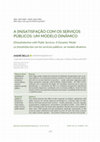
Revista Latinoamericana de Opinión Pública (RLOP), 2022
RESUMO: Este artigo avalia o efeito da economia na satisfação da população com os serviços públic... more RESUMO: Este artigo avalia o efeito da economia na satisfação da população com os serviços públicos. A contribuição empírica central é um índice nacional de satisfação com os serviços básicos do governo - saúde, educação, segurança, habitação, transporte, emprego, meio ambiente e Bolsa Família - de 1989 a 2017-, estimado com o algoritmo de díades. Os resultados mostram que as taxas de desemprego, o crescimento do PIB e as avaliações prospectivas egotrópicas da economia impactam a satisfação com os serviços públicos. Como tal, este estudo conecta duas agendas de pesquisa principais: a qualidade da democracia e a política macro. ABSTRACT: This article assesses the effect of the economy on mass satisfaction with public services. Its central empirical contribution is a national index of satisfaction with basic government services – health, education, security, housing, transportation, employment, environment, and Bolsa Família – from 1989 to 2017 estimated with the dyad-ratios algorithm. Results show that unemployment rates, GDP growth and the prospective egotropic assessments of the economy impact satisfaction with public services. As such, this study connects two major research agendas – the quality of democracy and the macro polity.
Vol. 11 Nº 1 (2022) by Revista Latinoamericana de Opinión Pública (RLOP)
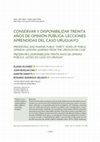
Revista Latinoamericana de Opinión Pública (RLOP), 2022
RESUMEN: América Latina tiene una larga trayectoria de estudios de opinión pública; las encuestas... more RESUMEN: América Latina tiene una larga trayectoria de estudios de opinión pública; las encuestas son una herramienta utilizada de forma frecuente para conocer las opiniones, actitudes y comportamientos de los ciudadanos. Sin embargo, a menudo éstos se mantienen privados, siendo inaccesibles para investigadores y tomadores de decisiones. Asimismo, las consultoras responsables enfrentan desafíos particulares para hacer disponibles los datos. Esta nota muestra un posible camino. En él describimos la experiencia del Laboratorio de Opinión Pública y Redes Sociales (LOPReS) de Uruguay, un ejemplo de interseccionalidad entre academia, sector privado y financiamiento público, que permitió la liberación de más de 200 encuestas de opinión pública realizadas entre 1993 y 2020. Asimismo, reflexionamos sobre tres importantes lecciones aprendidas a partir del proyecto: la relevancia de la construcción de vínculos de confianza, la generación de incentivos para la colaboración y la importancia del financiamiento. El caso sirve de ejemplo para analizar estrategias que permitan la apertura de información, con la participación de diversos actores trabajando de forma colaborativa y sus oportunidades para la investigación. ABSTRACT: Latin America has a long history of public opinion studies, surveys are a frequently used tool to understand citizens’ opinions, attitudes and behaviors. However, these are often private information, being inaccessible to researchers and policymakers. In addition, pollesters face particular challenges in making data available. This article shows a possible path by describing the experience of the Laboratory of Public Opinion and Social Networks (LOPReS) of Uruguay. The LOPReS is an example of colaboration between academia, the private sector and public financing, which allowed the dissemination of more than 200 public opinion surveys carried out among 1993 and 2020. We reflect on three important lessons learned from the project: the relevance of building trusting bonds, the generation of incentives for collaboration, and the importance of financing. The case serves as an example to analyze strategies that allow the openness of information, with the collaboration of various actors working together and the research opportunities that emerge from the results.
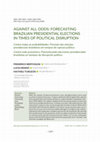
Revista Latinoamericana de Opinión Pública (RLOP), 2022
When the number of observed elections is low, subnational data can be used to perform electoral f... more When the number of observed elections is low, subnational data can be used to perform electoral forecasts. Turgeon and Rennó (2012) applied this solution and proposed three forecasting models to analyze Brazilian presidential elections (1994-2006). The models, adapted from forecasting models of American and French presidential elections, considers economic and political factors. We extend their analysis to the recent presidential elections in Brazil (2010, 2014 and 2018) and find that the addition of the three recent elections does not improve the accuracy of our forecast models although it strengthens the relationship between the explanatory variables and vote for the incumbent. We also find that models based on the popularity of the incumbent outperform those based on trial-heat polls and that electoral forecast models can survive earthquake elections like the 2018 election that led to the unexpected rise of “outsider” and extremist candidate Jair Bolsonaro.
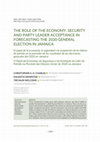
Revista Latinoamericana de Opinión Pública (RLOP), 2022
Three econometric models were built between January and March 2020 to predict the September 3, 20... more Three econometric models were built between January and March 2020 to predict the September 3, 2020 General Election in Jamaica. These are the economics and security model (model1), the economics and security model with JLP leader acceptance (model 2), and the economics and security model with PNP leader acceptance (model 3). All three models accurately predicted a win for the Jamaica Labour Party. A Jack-knife resampling was performed for cross validation. These models show how the macro-economy, security concerns and party leader popularity influence election outcomes, with similar findings in the literature. However, there are peculiarities in the Anglophone Caribbean because the Jamaican voters respond to economic and security concerns in different ways than the voters in the global north. For example, increases in the debt to GDP ratio and the homicide rate predicted a JLP win. This work should be replicated in the Caribbean and Latin America using panel data.
Revista Latinoamericana de Opinión Pública (RLOP), 2022
The purpose of this article is to explore electoral forecasting in two-horse races in new democra... more The purpose of this article is to explore electoral forecasting in two-horse races in new democracies. Specifically, it applies a Bayesian dynamic linear model (coined the Two-Stage Model, TSM) to look at the 2020 Chilean two-question national plebiscite. The ultimate objective is to test the TSM in terms of accuracy (how close the forecast is to the election results), precision (how close the forecast is to other methods of prediction) and error (how the forecast deviates from perfect accuracy/precision). The article finds that while the TSM does appear to be a stable estimator, its accuracy and precision is affected under certain conditions. Using the difference in the results for each of the two questions, the article discusses how sharp and unexpected shifts in electoral preferences can affect forecasts.
Revista Latinoamericana de Opinión Pública (RLOP), 2022
The Peruvian political landscape is dominated by the weakness of party organizations, the continu... more The Peruvian political landscape is dominated by the weakness of party organizations, the continuous rotation of political personalities, and, in turn, high electoral volatility and uncertainty. Nevertheless, we observe patterns of electoral competition that suggest candidates learn to capture the political center and compete over the continuation of an economic model that has sustained growth. We use this information to record the vote intention for the candidate viewed as the lesser evil. Our forecasting results predict a good share of the variation in political support for this candidate. The out-of-sample prediction also comes fairly close to the real electoral results. These findings provide some degree of electoral certainty in an area that, to date, remains understudied.
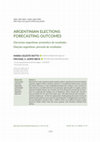
Revista Latinoamericana de Opinión Pública (RLOP), 2022
Election forecasts, based on public opinion polls or statistical structural models, regularly app... more Election forecasts, based on public opinion polls or statistical structural models, regularly appear before national elections in established democracies around the world. However, in less established democratic systems, such as those in Latin America, scientific election forecasting by opinion polls is irregular and by statistical models almost non-existent. Here we attempt to ameliorate this situation by exploring the leading case of Argentina, where democratic elections have prevailed for the last thirty-eight years. We demonstrate the strengthsand the weaknesses-of the two approaches, finally giving the nod to structural models based political and economic fundamentals. Investigating the presidential and legislative elections there, 1983 to 2019, our political economy model performs rather better than the more popular vote intention method from polling.
Vol. 10 Nº 2 (2021) by Revista Latinoamericana de Opinión Pública (RLOP)
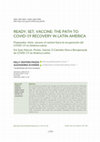
Revista Latinoamericana de Opinión Pública (RLOP), 2021
The coronavirus pandemic has ravaged countries across Latin America. Although the region continue... more The coronavirus pandemic has ravaged countries across Latin America. Although the region continues to suffer, the promise of vaccinations provides reason for hope. As vaccines become more widely accessible in Latin America, public support for and willingness to receive the vaccine will be essential to pandemic recovery. Recognizing this, politicians in the region are already actively publicly promoting vaccination. In this research note, we explore Latin Americans' attitudes on vaccine acceptance as well as the influence of political recruitment for vaccination and both consumption of and trust in news from politicians on self-reported attitudes of vaccine acceptance. We learn that, in general, Latin Americans are receptive to vaccination but that acceptance varies as a function of country, time, and recruitment and, interestingly, that Latin Americans are actually dissuaded from vaccination if encouraged by politicians. We conclude with a discussion and a plea that vaccination campaigns remain separate from political ones.
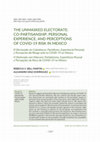
Revista Latinoamericana de Opinión Pública (RLOP), 2021
Research suggests partisanship influences individual perceptions of COVID-19 risk and preventativ... more Research suggests partisanship influences individual perceptions of COVID-19 risk and preventative behaviors. We ask a distinct but equally urgent question: what factors are associated with variation in risk perception among copartisans? Even among members of the same party, some individuals' risk perceptions reflect the party line while others deviate from it. We explore this question in Mexico, where the president utilized his rhetoric to downplay the severity of the pandemic. Why do some of the presidents' co-partisans perceive COVID-19 as a serious risk (despite partisan appeals to the contrary), while others do not? Drawing on theories of risk perception, we hypothesize that this variation is associated with personal risk experience, like knowing someone who contracted COVID-19. We test this hypothesis via a large-n survey of MORENA supporters. We find that personal experiences are consistently associated with variation in risk perception. Strength of partisan ties, meanwhile, is only activated when paired with risk experience.
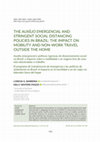
Revista Latinoamericana de Opinión Pública (RLOP), 2021
Non-pharmaceutical interventions to increase physical distancing have been instrumental in mitiga... more Non-pharmaceutical interventions to increase physical distancing have been instrumental in mitigating the spread of COVID-19. Governments have enacted stringent public health policies that impose limits on mobility outside the household. However, for containment policies to be effective, there is a growing understanding that emergency aid programs must be designed to ensure that the most vulnerable receive financial and in-kind aid resources to support their ability to “stay at home.” In this study, we use survey data from an Oxford USP-FGV collaborative research initiative to empirically assess the effectiveness of these two policies in reducing mobility with an eye to those at-risk or living in conditions of poverty in eight Brazilian capitals. We learn that, in general, neither stringent public health policies and receipt nor promised receipt of the Auxílio Emergencial were effective in limiting mobility outside of the home. We do, however, find limited evidence that receipt or promised receipt of the Auxílio Emergencial marginally limited non-work trips outside of the home, especially in city/state combinations with stringent public health policies. We conclude by discussing the policy implications of our findings.
Revista Latinoamericana de Opinión Pública (RLOP), 2021
The current pandemic has challenged political leaders. As governments introduced containment poli... more The current pandemic has challenged political leaders. As governments introduced containment policies, presidential approval in several countries started to rise. This phenomenon brought back discussion of the rally-'round-the-flag effect, which refers to the public's propensity to put aside political differences and support presidents during episodes of international crises. By focusing on four Latin American presidents, we analyze such an effect and the conditions that mediate it, considering its significant variation in the region. We propose that the change in presidential popularity is short-lived and ultimately conditioned by the timing and stringency of the policy responses, the pandemic's framing, and the opposition's opportunities for policy criticism.
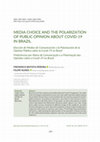
Revista Latinoamericana de Opinión Pública (RLOP), 2021
Brazil is one of the countries most affected by the Covid-19 pandemic. Yet, while rates of contag... more Brazil is one of the countries most affected by the Covid-19 pandemic. Yet, while rates of contagion and deaths increase over time, polls show that opinions about the pandemic become less concerned about the virus and less supportive of mitigation measures. According to observers, a key factor in this process is President Bolsonaro's denialist stance. In this paper, we show that patterns of media choice help explain how Bolsonaro influences public opinion over time. Using three online surveys conducted at different stages of the pandemic, we show that the divergence in views about the pandemic is driven largely by Bolsonaro supporters who prefer to consume news online. The findings have implications not just for understanding the politicization of the pandemic in Brazil, but also for the relationship between populism and mass communications in the social media era.
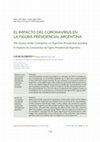
Revista Latinoamericana de Opinión Pública (RLOP), 2021
RESUMEN: Alberto Fernández asumió la presidencia en diciembre de 2019 y el debate sobre si su lid... more RESUMEN: Alberto Fernández asumió la presidencia en diciembre de 2019 y el debate sobre si su liderazgo se encontraba eclipsado por la figura de la vicepresidenta Cristina Kirchner estaba instalado. En este contexto, el coronavirus estalla en Argentina y el presidente logra altos niveles de aprobación (incluso por encima de los que registró luego de su asunción) a medida que la preocupación social por la pandemia aumentaba. ¿Cuál es el impacto real del coronavirus sobre la figura del presidente? A su vez, este salto en la valoración de su gestión impulsa la consolidación de su autoridad, pero, al mismo tiempo, abre el interrogante sobre si se trata de una consolidación real o momentánea. ABSTRACT: When Alberto Fernández the presidency in December 2019 and the debate on whether his leadership was eclipsed by the presence of the vice president Cristina Kirchner had already begun. In this context, the coronavirus spreads throughout Argentina and the president achieves high levels of approval (even above those achieved after assuming the office) as long as social concerns about the pandemic were increasing. What is the real impact of coronavirus on the president?s figure? At once, this increased appraisal of his job performance triggers the consolidation of his authority but, at the same time, generates the question mark as to whether this consolidation is real or temporary.
Vol. 10 Nº 1 (2021) by Revista Latinoamericana de Opinión Pública (RLOP)
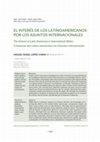
Revista Latinoamericana de Opinión Pública (RLOP), 2021
Si bien existen numerosas investigaciones sobre el interés y el conocimiento de los ciudadanos so... more Si bien existen numerosas investigaciones sobre el interés y el conocimiento de los ciudadanos sobre los asuntos internacionales en los Estados Unidos y Europa, los estudios comparados sobre estos temas en América Latina siguen siendo escasos. Este artículo pretende extender el conocimiento sobre este fenómeno a la región usando la encuesta “Las Américas y el Mundo” realizada en 2014/5 en siete de los principales países de América Latina. Si bien existen diferencias entre países, este artículo busca identificar patrones comunes como el amplio interés que tienen los latinoamericanos por las noticias internacionales, especialmente cuando estas implican a su país de origen. Sin embargo, los resultados preliminares cuestionan la existencia de una brecha de género en el consumo de noticias internacionales, identificada por la literatura comparada.
Revista Latinoamericana de Opinión Pública (RLOP), 2021
Many migrants to the U.S. are engaged in public affairs in their country of origin. Whether such ... more Many migrants to the U.S. are engaged in public affairs in their country of origin. Whether such engagement impedes or encourages engagement in American politics remains an open question. Drawing from a unique two-wave panel survey of Mexican immigrants conducted in 2006, with surveys waves fielded to correspond to national elections in Mexico and the United States, we examine the relationship between transnational
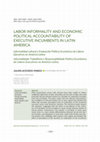
Revista Latinoamericana de Opinión Pública (RLOP), 2021
Many governments across Latin America have been unable to reduce stubbornly high levels of labor ... more Many governments across Latin America have been unable to reduce stubbornly high levels of labor informality and the lack of legal and social protection has put informal workers in a situation of continuous economic peril and uncertainty. This paper argues that the inherent characteristics and conditions of informal workers act as noisy signals that diminish the effect that economic perceptions have on evaluations of the incumbent executive across Latin American countries. The empirical results support the argument, suggesting that the effect of perceptions of the economy on evaluations of the incumbent is lower among informal relative to formal workers. Furthermore, this dynamic is prevalent in urban areas where there is a more evident differentiation between formal and informal workers, and disappears in rural areas, where both formal and informal workers face challenges that produce noisy signals and diminish the effect of perceptions of the economy on evaluations of the incumbent.






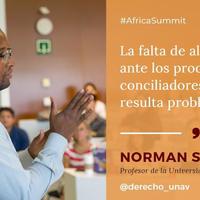
Uploads
Vol. 11 Nº 2 (2022) by Revista Latinoamericana de Opinión Pública (RLOP)
Vol. 11 Nº 1 (2022) by Revista Latinoamericana de Opinión Pública (RLOP)
Vol. 10 Nº 2 (2021) by Revista Latinoamericana de Opinión Pública (RLOP)
Vol. 10 Nº 1 (2021) by Revista Latinoamericana de Opinión Pública (RLOP)
experience an increase in their engagement. Meanwhile, women, those in unsafe
neighborhoods, and Afro-Brazilians do not experience such an increase. Those
who have not experienced discrimination also increase their participation, while
those who have experienced discrimination do not.